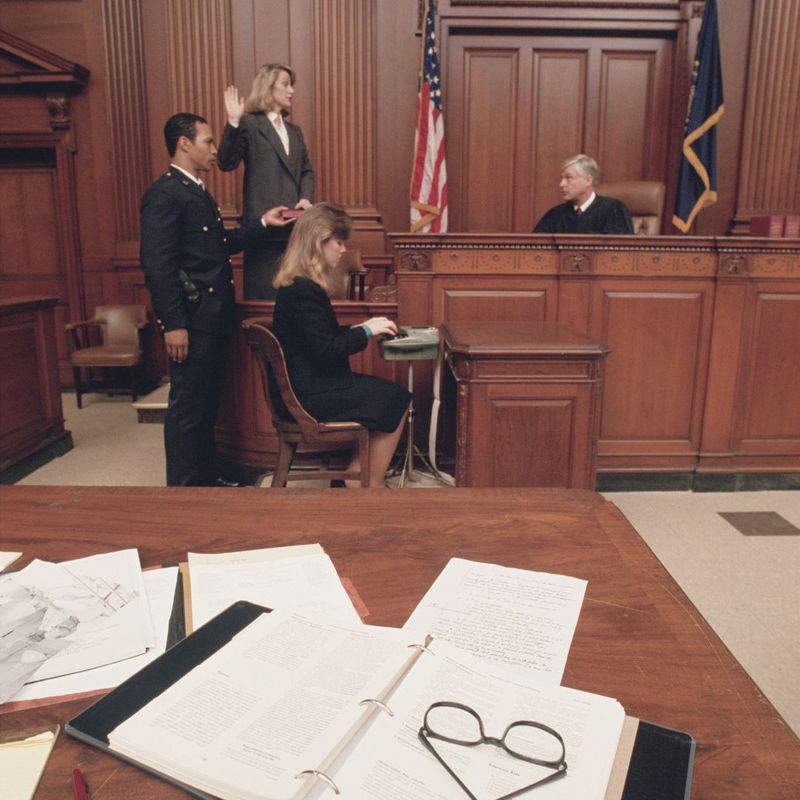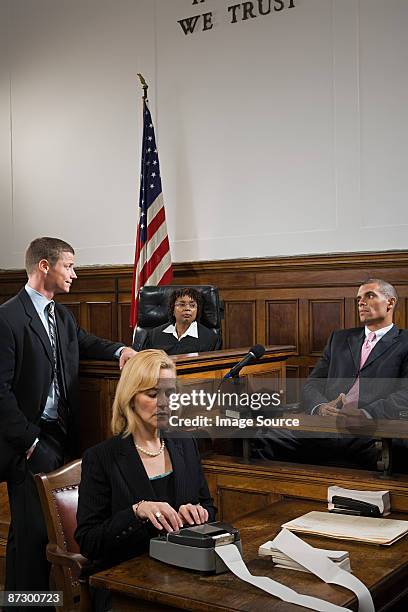How Fast Does a Court Typist Need to Type? Industry Standards
How Fast Does a Court Typist Need to Type? Industry Standards
Blog Article
Discover the Necessary Abilities and Responsibilities of a Court Typist in Today's Legal Landscape
As a court typist, you hold a critical placement in the lawful system. Your abilities exceed just typing; they include comprehending complicated legal terms and procedures while guaranteeing accuracy in every paper. You collaborate closely with lawyers and courts, making your role indispensable for efficient communication. But what specific abilities do you require, and just how can you adjust to the ever-evolving technological landscape? Let's explore this further.
The Role of a Court Typist in the Judicial System
As the foundation of the judicial system, a court typist plays a vital function in assuring that lawful procedures are properly documented. You are in charge of recording every little thing from witness testaments to courts' rulings, catching every detail with accuracy. Your job helps preserve a clear and irreversible record of court tasks, which is important for future referral and appeals.In the court room, you're usually the unhonored hero, silently ensuring that all talked words end up being written documents. You keep discretion, understanding the delicate nature of legal matters. You additionally collaborate very closely with judges, attorneys, and staffs to guarantee the smooth circulation of details. By working efficiently under pressure, you add to the general efficiency of the judicial procedure. Your attention to detail and dedication to accuracy not only maintain the honesty of the court yet likewise sustain the broader pursuit of justice in society.
Vital Skills Required for Court Typists
Court typists need an one-of-a-kind mix of skills to master their essential duty within the judicial system. Firstly, you have to have exceptional typing abilities, frequently attaining rates of 70 words per minute or even more. Precision is vital; also a minor mistake can result in substantial misunderstandings in lawful documents. You'll likewise require strong attention to information, making certain every word is recorded correctly.Additionally, great organizational skills are vital for taking care of numerous cases and papers efficiently. Being tech-savvy is essential, as you'll use various software program programs for data processing and paper monitoring. Strong communication skills help you connect with courts, attorneys, and other court employees effectively.Lastly, a sense of professionalism and trust and confidentiality is a must, as you'll manage sensitive details daily. By sharpening these abilities, you'll be well-prepared to contribute significantly to the court atmosphere.
Recognizing Legal Terminology and Procedures
As a court typist, you need to realize key legal terms and procedures to execute your work effectively. Comprehending these ideas not just aids you record properly but additionally assures you can follow the flow of court process. Let's check out the important legal vocabulary and a review of court processes you must know.

Secret Legal Terms
Comprehending essential legal terms is crucial for any person operating in a court room setting. You'll frequently run into terms like "plaintiff," which describes the individual launching a lawsuit, and "offender," who reacts to the accusations. Understanding the distinction in between "civil" and "criminal" cases assists you realize the context of the procedures. Familiarity with "subpoena" assurances you comprehend the lawful papers compelling witnesses to indicate. Additionally, terms like "evidence" and "testament" are important, as they connect straight to the details provided in court. Grasping these terms not only enhances your performance as a court typist yet likewise ensures that you add to the precision and quality of lawful records. Your duty rests on specific terminology, so don't take it lightly!
Court Procedures Overview
Familiarity with essential legal terms sets the stage for comprehending court procedures. Recognizing just how a court room features is important for any court typist. You'll run into procedures like arraignments, where offenders hear fees, and activities, which are ask for a court judgment. Acquaint yourself with the duties of staffs, judges, and attorneys, as each plays an essential part in procedures. Knowing the flow of a test-- from court option to closing arguments-- aids you properly catch the procedures - court typist. Furthermore, understanding the value of keeping a exact and objective record can't be overemphasized. By understanding these aspects, you'll boost your performance in documenting important court activities and add considerably to the lawful procedure. Your duty is critical in maintaining the integrity of court documents
The Effect of Modern Technology on Court Typing
Modern technology's changed court keying in significant means. With digital transcription devices, you can enhance effectiveness and precision, making your task simpler than ever. Plus, remote court procedures have transformed just how you approach your job, requiring versatility to brand-new styles and modern technologies.
Digital Transcription Tools
As digital transcription tools remain to evolve, they're changing the method court typists perform their obligations. These devices simplify the transcription procedure, permitting you to capture spoken words precisely and effectively. With voice acknowledgment software application, you can record real-time procedures, minimizing hands-on input and reducing errors.Moreover, cloud-based platforms make it possible for simple accessibility to files, so you can work collaboratively with legal click here for info groups and assure everyone's on the very same page. Automated format functions save you time on repeated jobs, letting you concentrate on material quality.Additionally, digital tools enhance security, safeguarding sensitive information through encrypted storage and regulated accessibility. By embracing these modern technologies, you can improve your performance and keep the high standards needed in the legal area.
Remote Court Process
The rise of remote court process has considerably changed the landscape for court typists. You now rely on technology to record and transcribe online hearings from your home or office. Experience with video conferencing systems is essential, as you'll require why not try this out to navigate them effortlessly to assure an exact document. You'll also need to handle audio quality, as history sound or link problems can disrupt your work. Furthermore, remote procedures demand quick reasoning; you might need to clear up statements or request repeats in real-time. Staying organized and reliable is important, as deadlines stay limited. Welcoming these technical developments not just improves your abilities however likewise guarantees you stay a very useful property in today's progressing lawful setting.
Accuracy and Attention to Detail in Transcription
Accuracy and focus to information are vital in transcription, especially for court typists. court typist. Every word counts when you're transcribing legal process. A solitary mistake can alter the definition of a statement, possibly influencing the end result of a case. You have to pay attention very carefully, assuring that you capture every nuance and inflection in the audio speaker's voice.Your capacity to catch typos and grammatical mistakes is vital. You do not just kind; you verify that the final record is an accurate depiction of what was stated in court. This needs an eager eye and a complete understanding of lawful terminology.Moreover, you'll need to be knowledgeable about various accents and talking styles, as court rooms can host a selection of speakers. By developing your precision and attention to information, you'll maintain the stability of legal records and contribute considerably to the judicial process. Your diligence around truly makes a distinction

Time Monitoring and Business Skills
While taking care of numerous tasks, efficient time administration and business abilities are important for court typists. You'll frequently juggle different deadlines, from recording court process to preparing legal files. Prioritizing your workload is necessary; identify immediate tasks and tackle them initially to ensure prompt submissions.Organizational abilities come into play when you're sorting with instance records, files, and notes. Keeping everything neatly categorized not just conserves time yet likewise reduces the risk of mistake. Using devices like calendars, to-do lists, or specialized software application can assist you remain on track and manage your time effectively.Moreover, establishing details goals for each and every work session can enhance your performance. Break bigger projects right into smaller sized tasks to make them much more manageable. By refining these abilities, you'll not only improve your performance but also contribute significantly to the smooth operation of the legal process, ensuring whatever runs like clockwork.
Continuing Education and Professional Growth Opportunities
Purchasing your abilities does not quit with time monitoring and organization. As a court typist, you'll find that continuing education and expert development are necessary to staying competitive in the lawful area. Search for workshops or on the internet training courses concentrating on sophisticated typing strategies, legal terms, and transcription software. These can develop your skills and assist you adapt to the most recent technologies.Networking is just as important. Join professional organizations like the National Court Reporters Association (NCRA) or regional lawful organizations. They commonly provide resources, training sessions, and meetings that can improve your understanding and connect you with peers.Don' t forget qualification programs that can improve your credibility and marketability. Staying updated with the newest fads and finest methods in lawful paperwork will certainly boost your performance and accuracy, making you an important asset to any kind of lawful team. Buy your development, and you'll gain the incentives throughout your profession.
Regularly Asked Questions
What Is the Typical Wage Variety for a Court Typist?
A court typist's normal salary arrays from $30,000 to $55,000 each year, relying on experience and location. You may also discover chances for development visit with added abilities, bring about increased pay in the lawful area.

Are Court Typists Required to Have a Lawful Degree?
Court typists do not need a lawful level, but having one can be beneficial. You'll usually find that strong inputting abilities and knowledge of lawful terms are more vital for success in this duty.
What Are the Work Hours for a Court Typist?

Just How Do Court Typists Guarantee Privacy in Their Job?
You assure confidentiality by firmly dealing with delicate records, using encrypted software program, and adhering to rigorous methods. You stay knowledgeable about personal privacy laws and only share details with licensed employees, keeping rely on the judicial procedure.
Can Court Typists Work Remotely or Freelance?
Yes, you can function remotely or freelance as a court typist, especially if you have reputable technology and a safe environment. Numerous lawful experts currently embrace remote work, providing versatility and possibilities for independent typists. As the backbone of the judicial system, a court typist plays a necessary duty in assuring that legal procedures are precisely recorded. As a court typist, you need to realize crucial lawful terms and procedures to execute your task effectively. Mastering these terms not just enhances your efficiency as a court typist however additionally assures that you contribute to the precision and quality of lawful files. The increase of remote court proceedings has considerably transformed the landscape for court typists. As a court typist, you'll discover that proceeding education and learning and professional growth are essential to remaining competitive in the lawful field.
Report this page